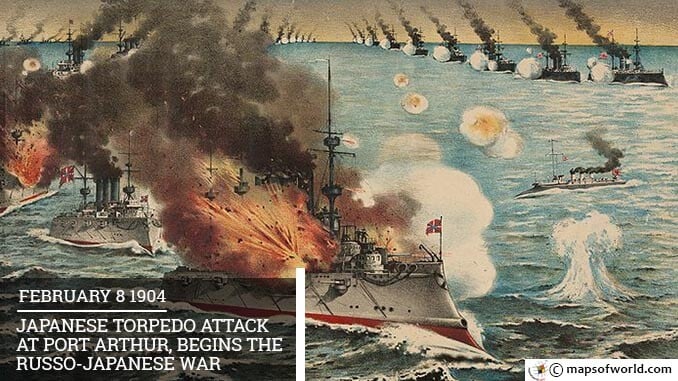On February 8, 1904, Japan launched a surprise attack on Russia in Port Arthur (in Manchuria, China). The attack announced the commencement of the Russo-Japanese War, one of the first major conflicts of the 20th century. By the end of the 19th century it became evident that the once mighty Chinese Empire was now crumbling. Russian imperial ambitions ran high and with the launch of the trans-Siberian railway, Russia decided to annex both Korea and Manchuria. China had already leased Russia, Port Arthur one of the few ice-free ports on the China Sea, as a naval base. Japan proved to be the one chink in these plans. At the negotiation table, the Japanese proposed a compromise – they would accept Russian domination of Manchuria if the Russians were willing to acknowledge their domination over in Korea. The Russian government declined the proposal but forbade the troops from making the first move in case of a conflict. Tsar Nicholas II, the Russian ruler, confident of victory in case of a showdown, believed that a war would gain favor for the imperial regime. The negotiations were broken off on February 6, 1904. A leading American banker of Jewish German origin, Jacob Schiff, egged Japan on in its anti-Russian military efforts by lending the nation $200 billion. Schiff was well-known for his dislike of the anti-Semitic Tsarist regime in Russia. The Japanese Imperial Navy, led by Admiral Togo Heihachiro, decided to launch a surprise torpedo boat destroyer attack on the Russian Fleet on the night of February 8, 1904. Port Arthur, on the Liaodong Peninsula in south Manchuria, had been chosen for the initial attack due to its strategic location. A conquest of Port Arthur would allow Japanese troops to land and tackle the ground forces on the mainland. A squadron of about 10 Japanese destroyers led the attack against the Russians. 16 torpedoes were fired in all and except three of them, the rest failed to find their mark. The Russians losses included the damages suffered by the battleships, Tsesarevich and Retvizan, and the cruiser Pallada. The Japanese attack was not a well-coordinated one. Admiral Togo had received false information about the security arrangements at the port and had split his divisions into two attack flotillas – thus greatly reducing the impact of both. Most of the Japanese destroyers lost contact with each other and remained ineffective. Despite the complete darkness and lack of moonlight – conditions generally considered ideal for a torpedo attack, the Japanese did not gain much from the surprise. The attack of the Japanese on unsuspecting Russians without a formal declaration of war has often been criticized by historians and political commentators. The Russo-Japanese War lasted from February 1904 through September 1905. While the initial battles of the war – including the Battle of Port Arthur – remained inconclusive, the final victory went to Japan. The stage had been set for Japan’s entry into the political environment of the world and into a future where two world wars were to occur. The Russo-Japanese War is often referred to as “the first great war of the 20th century”. The imperial administrations in both nations sought to settle their territorial ambitions in Korea and Manchuria through the war. The eventual defeat of Russia in the war was a low point in the history of the Russian Empire. People lost faith both in the Tsar’s administration and in the country’s military which set the stage for the eventual outbreak of the 1905 Russian Revolution. At the time it was also inconceivable that a partly European power (Russia) would face defeat at the hands of an Asian nation which had hitherto remained nondescript due to its seclusion. You may also like : February 8 1828 – Legendary Science Fiction Writer Jules Verne is Born in Nantes
February 8 1904 -Japanese torpedo attack at Port Arthur, begins the Russo-Japanese War
On February 8, 1904, Japan launched a surprise attack on Russia in Port Arthur (in Manchuria, China). The attack announced the commencement of the Russo-Japanese War, one of the first…
